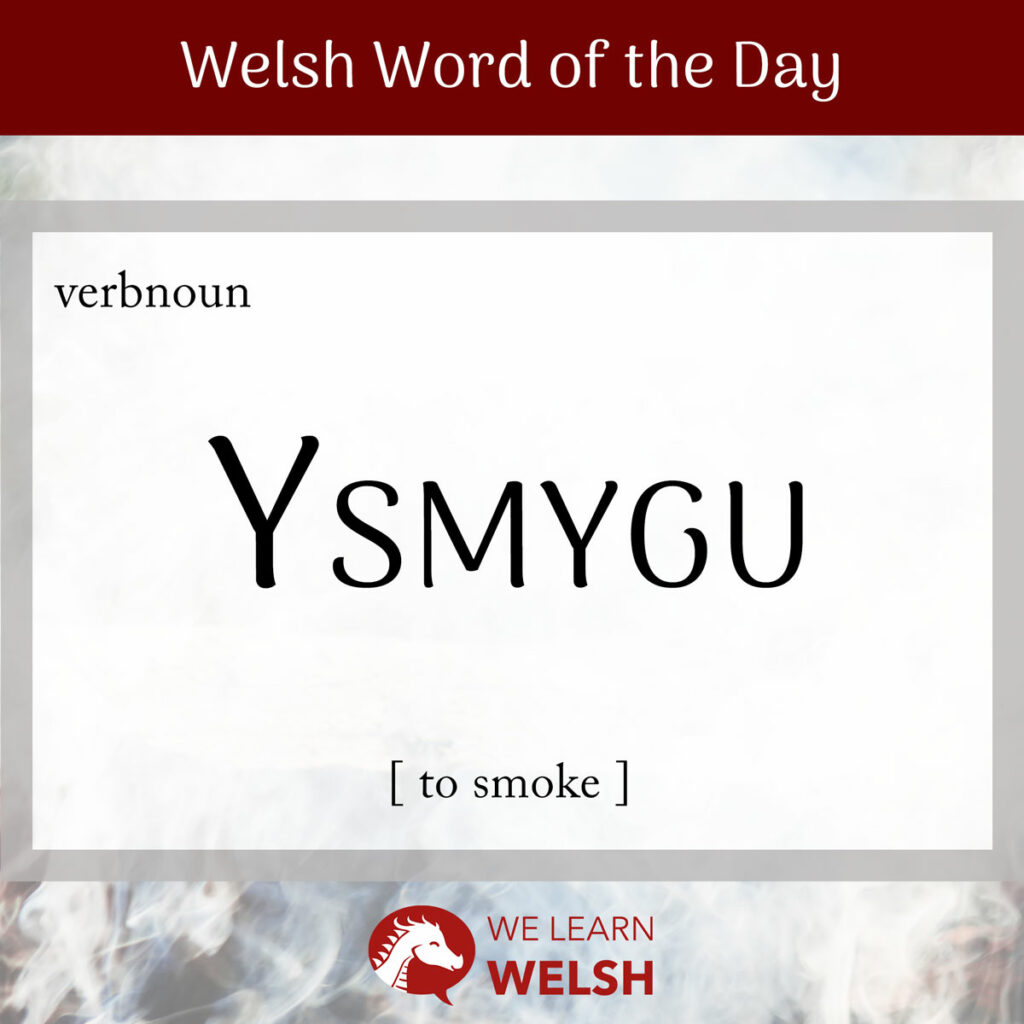I only had one other friend from Wales at university, and she didn’t come from a Welsh-speaking family or go to Welsh-medium school. However, in Wales, all students do have to learn Welsh as a second-language, as you might learn French or German.
I was quite intrigued to know what words and phrases she had to learn for the GCSE exam – and she told me the only one she could remember was dw i’n ysmygu sigaréts ar ddydd Mawrth (I smoke cigarettes on Tuesdays)! So there you go; my anecdotal evidence suggests that if you want to get a Welsh GCSE, ysmygu (to smoke) might be a useful word to learn.
ysmygu
to smoke
Ysmygu, sometimes rendered just smygu for short, comes from the word mygu, an older word meaning the same thing – to smoke, but often used more broadly, as in of a simnai (chimney). Ysmygu tends to refer specifically to people smoking sigaréts (cigarettes) or similar.
Mygu itself is derived from the noun mwg (smoke). It’s a funny word because it means to smoke as in to smoke food or to smoke something out, but it also has a separate meaning as a synonym of mogi (to suffocate). So mygu samwn is technically valid as a translation of to smoke salmon, but it could sound like you’re saying to suffocate salmon! That’s probably why many people would instead go for the more long-winded sychu samon ‘da mwg (to dry salmon with smoke).
Interestingly, the reason mygu was altered to become ysmygu seems to be due to the influence of the English smoke, even though there’s already a valid Welsh-ification of this word which is smocio. You may hear people using smocio instead of ysmygu in casual conversation.
Ti’n smygu? Gad i ni fynd allan a chymryd mwgyn.
Do you smoke? Let’s go outside and have a smoke.
A smoker is an ysmygwr, a smygwr or simply a smociwr.
Technically, this is masculine due to the ending wr which comes from gŵr (husband or man). You could call a female smoker an ysmygwraig but I’d be very surprised to hear this! The masculine version is fine regardless of gender.
Another thing to remember is that we wouldn’t normally use phrases like a heavy smoker, a light smoker or a social smoker in Welsh. Instead, we would use the word ysmygu itself, paired with an adverb. For example, mae hi’n ysmygu’n drwm ofnadwy (she smokes very heavily). You could also translate the English expression she smokes like a chimney literally – mae hi’n ysmygu fel simnai or mae hi’n smocio fel simnai.
There’s also the word mygyn, which usually becomes mwgyn in the South. This is a diminutive form of smoke, so it means a little smoke. Asking someone to take a quick smoke could often be phrased as cymryd mygyn / cymryd mwgyn.
Here is how ysmygu conjugates:
| Future | Conditional | Past | |
| First person singular | (Y)smyga(f) i I will smoke | (Y)smygwn i I would smoke | (Y)smygais i I smoked |
| First person plural | (Y)smygwn ni We will smoke | (Y)smygen ni We would smoke | (Y)smygon ni We smoked |
| Second person singular / informal | (Y)smygi di You will smoke | (Y)smyget ti You would smoke | (Y)smygaist ti You smoked |
| Second person plural / formal | (Y)smygwch chi You will smoke | (Y)smygech chi You would smoke | (Y)smygoch chi You smoked |
| Third person singular | (Y)smygith o/e/hi He/she will smoke | (Y)smygai fo/fe/hi He/she would smoke | (Y)smygodd o/e/hi He/she smoked |
| Third person plural | (Y)smygan nhw They will smoke | (Y)smygen nhw They would smoke | (Y)smygon nhw They smoked |
Smoke as an imperative would be ysmygwch if addressing more than one person or speaking formally, but otherwise ysmyga.
The online Welsh dictionary Gweiadur defines ysmygu as the practice of sugno mwg tybaco (o sigarét, pibell, etc.) i’r geg a’r ysgyfaint (sucking tobacco smoke to the mouth and lungs). Let’s break this down word by word, as it’s useful vocabulary for talking about ysmygu.
- sugno = to suck; you could also use anadlu (to breathe, to inhale)
- mwg = smoke
- tybaco = tobacco; many smoke other substancese.g. mwg drwg (weed, literally bad smoke)
- o sigarét = from a cigarette; there is also sigâr = cigar
- pibell = a pipe
- geg = soft mutation of ceg (mouth)
- ysgyfaint = pair of lungs; singular ysgyfant = lung but this is rarely used
People start ysmygu for many reasons, often in order to ymlacio (relax) physically and mentally. However, the negative health effects are well-documented – particularly to the ysgyfaint (lungs) but also to the dant (teeth), calon (heart), and pledren (bladder). It’s also very caethiwus (addictive) due to the presence of nicotîn (nicotine) in tybaco.
Dwi’m yn ysmygu bellach, ond mae fy ngŵr yn defnyddio fêps.
I don’t smoke anymore, but my husband uses vapes.
One of the most successive iechyd cyhoeddus (public health) campaigns in modern history has been the one against ysmygu. In the UK alone, bans on ysmygu in enclosed public spaces, adverts warning against the peryglon (risks), and free support to stopio smygu (quit smoking) provided by the GIG (NHS), have had a massive positive effect. Fewer and fewer people ysmygu every year.
However, in recent years awdurodau iechyd (health authorities) have become more concerned about the practice of e-smygu (vaping). E-smygu is done with e-sigaréts (e-cigarettes), sometimes also called fêps (vapes).
While having less severe effects on most of the corff (body) due to not using tybaco, it’s likely that e-smygu is even worse for the ysgyfaint and system anadlu (respiratory system). Still, since it’s a relatively recent practice, the long-term effects are not that clear.
In 2024, the Welsh government passed a new bill, the Bil Tybaco a Fêps (Tobacco and Vapes Bill), developed with the other three nations of the UK. The bill’s aim is to create a so-called cenhedlaeth ddi-fwg (smoke-free generation). It’s well-documented that stopio smygu is incredibly difficult, so this is a lofty goal – but also an exciting and optimistic one.


